| 2010 Honorary Degree Recipients . . . and the 2010 Commencement Speaker |
|
, |
|
University Secretary Leslie Laird Kruhly has announced the 2010 honorary degree recipients and the Commencement speaker. The Office of the University Secretary manages the honorary degree selection process and University Commencement. At Penn’s 254th Commencement on Monday, May 17, 2010, these eight individuals will be presented with honorary degrees as noted below.
- Sandra M. Faber: Doctor of Science
Professor of Astronomy and Astrophysics, University of California, Santa Cruz, Astronomer, University of California Observatories/Lick Observatory
- Paul Farmer: Doctor of Science
Chair and Founding Director of Partners In Health, Maude and Lillian Presley Professor of Social Medicine, Department of Global Health and Social Medicine, Harvard Medical School
- Jon M. Huntsman, Jr., C’87: Doctor of Laws
U.S. Ambassador to China
- Abdullah Ibrahim: Doctor of Music
South African Jazz Pianist (Mr. Ibrahim could not attend Commencement on May 17, 2010. No honorary degree was granted.)
- Risa J. Lavizzo-Mourey, WG’86: Doctor of Laws
President and CEO, Robert Wood Johnson Foundation
- Greg Mortenson: Doctor of Humane Letters
Co-Founder and Executive Director, Central Asia Institute
- Peter C. Nowell, M’52: Doctor of Science
Gaylord P. and Mary Louise Harnwell Emeritus Professor of Pathology and Laboratory Medicine, University of Pennsylvania
- James S. Riepe, W’65, WG’67: Doctor of Laws
Senior Advisor and Retired Vice Chairman, T. Rowe Price Group, Inc
Commencement Speaker
Jon M. Huntsman, Jr
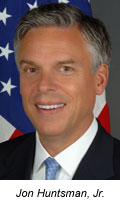 |
A dedicated public servant who has been recognized nationally for his leadership, Jon M. Huntsman, Jr. was selected by President Barack Obama to serve as the United States Ambassador to China in May, 2009. His nomination was unanimously confirmed by the United States Senate. Before assuming his role as Ambassador, he was elected to two terms as Governor of Utah. In the election to his second term in 2008, he received a majority vote in all 22 counties of his state.
Ambassador Huntsman’s public service career began as a White House staff assistant to President Ronald Reagan and has since included appointments as Deputy Assistant Secretary of Commerce for Asia, U.S. Ambassador to Singapore and Deputy U.S. Trade Representative. He played a critical role in launching global trade negotiations in Doha, Qatar in 2001, guiding the simultaneous accession of China and Taiwan into the World Trade Organization.
Ambassador Huntsman’s breadth of experience in Asia has been developed over a lifetime of interest and involvement. He is a founding director of the Pacific Council on International Policy and has served on various boards such as the Brookings Institute Asia Policy Board, the Center for Strategic and International Studies Pacific Forum, the Asia Society in New York and the National Bureau of Asian Research.
As Governor of Utah, Ambassador Huntsman worked toward increasing the state’s economic competitiveness and maintaining human services. Maximizing funding to the state’s public education system, he concentrated on raising teacher compensation and increasing access to early childhood education programs. During his tenure, Utah was recognized as the Best Managed State in America by the Pew Center on the States. Ambassador Huntsman also served as chairman of the Western Governors Association and on the Executive Committee of the National Governors Association.
Prior to his election as governor, Ambassador Huntsman served as the Chairman of Huntsman LLC and Vice Chairman of the Huntsman Chemical Corporation. He was the first president and CEO of the Huntsman Cancer Foundation at the University of Utah.
Ambassador Huntsman graduated from the University of Pennsylvania in 1987 with a bachelor’s degree in international politics. He was a member of the University’s Board of Trustees from 1996 through 2000. Ambassador Huntsman’s family has been a strong benefactor of the University, most notably endowing the Huntsman Program in International Studies and Business in 1994 and the Jon M. Huntsman Hall at the Wharton School, which opened in 2002.
|
Honorary Degree Recipients
Sandra M. Faber
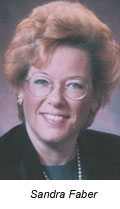 |
Dr. Sandra Faber is an observational astronomer who is a pioneer in the study of the formation and evolution of galaxies and of the structure of the universe. After completing her undergraduate degree at Swarthmore College in 1966, Dr. Faber began her studies at Harvard University, identifying scaling laws for elliptical galaxies, research that she continues to this day. After earning her PhD from Harvard University in 1972, she became the first female staff member at the prestigious Lick Observatory at the University of California, Santa Cruz.
Dr. Faber made some of her first major discoveries at Lick Observatory, including the Faber-Jackson relation, the first structural scaling law for galaxies. Other significant contributions include large-scale flow perturbations in the expansion of the universe caused by superclusters of galaxies, ubiquitous black holes at the centers of galaxies and the role of dark matter in galaxy formation. Dr. Faber was one of three astronomers who diagnosed the optical flaw in the Hubble Space Telescope and played a major role in its repair. She also established the scientific case for Keck Telescopes and led construction of a new spectograph, DEIMOS, for Keck II in order to study distant galaxies.
Dr. Faber has received numerous honors and awards, including the 2009 Bower Award from the Franklin Institute in Philadelphia, the Centennial Medal from the Graduate School of Arts and Sciences of Harvard University, the Heinemann Prize from the American Astronomical Society and the Antoinette de Vaucouleurs Medal from the University of Texas, as well as several honorary degrees.
Today, Dr. Faber continues her research at the Lick Observatory and serves as University Professor of Astronomy and Astrophysics at the University of California, Santa Cruz. She has authored over 400 scientific articles and serves on several advisory boards, including the Board of Overseers at Harvard University and the Board of Trustees at the Carnegie Institution of Washington.
|
Paul Farmer
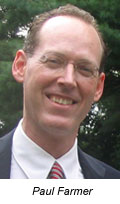 |
Medical anthropologist and physician Dr. Paul Farmer has dedicated his life to treating some of the world’s poorest populations, helping to raise the standard of health care in underdeveloped areas of the world. A leading figure in the field of international infectious diseases and human rights, Dr. Farmer is one of the founding directors of Partners In Health (PIH), an international non-profit organization that provides direct health care services to and advocacy for the world’s most impoverished communities, including Haiti and several African nations.
Dr. Farmer began his long-standing commitment to Haiti in 1983, working to bring modern health care to villages in the country’s Central Plateau. In 1987, he established a small one-building medical clinic in the village of Cange, which has grown into a multi-service health complex with hospital and surgical capabilities, services for women and children, a primary school and a training program for health outreach workers.
In 2009, Dr. Farmer was appointed by former President Bill Clinton to the post of United Nations Deputy Special Envoy to Haiti. Following the January 12, 2010 earthquake, Dr. Farmer and his colleagues organized colleagues to attend to its victims and the World Health Organization named PIH the primary coordinator of the University Hospital in Port-au-Prince. Dr. Farmer also joined with world leaders and public health experts to discuss short- and long-term plans for the reconstruction of Haiti following the earthquake.
Dr. Farmer is the Presley Professor of Medical Anthropology and Chair of the Department of Social Medicine at Harvard Medical School as well as the Chief of the Division of Global Health Equity at Brigham and Women’s Hospital. He has written extensively on health, human rights and the consequences of social inequality. His most recent book, Pathologies of Power: Health, Human Rights, and the New War on the Poor, offers a new paradigm for critical approaches in anthropology for understanding globalization, public health, and the totality of human rights, social suffering and violence.
Among Dr. Farmer’s many awards and honors are the Heinz Award for the Human Condition, the Conrad N. Hilton Humanitarian Prize, the Outstanding International Physician Award from the American Medical Association and the “Social Entrepreneur of the Year” award by the Skoll Foundation. In 1993, Dr. Farmer was named a Fellow by the John D. and Catherine T. MacArthur Foundation. He is a member of the Institute of Medicine of the National Academy of Sciences and the American Academy of Arts and Sciences. Dr. Farmer is also the subject of the Pulitzer Prize winning book Mountains Beyond Mountains: The Quest of Dr. Paul Farmer, a Man Who Would Cure the World, by Tracy Kidder.
|
Abdullah Ibrahim
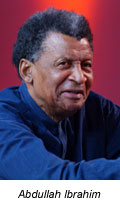 |
By fusing conventional jazz, traditional African songs and personal spirituality, Abdullah Ibrahim has inspired the world with his personal brand of musical elegance and style for over six decades. Regarded as one of the most influential South African jazz pianists, Mr. Ibrahim’s contributions as a musician and composer have created a quintessentially South African sound that is recognized the world over.
Mr. Ibrahim was born Adolphe Johannes Brand in Cape Town in 1934. He began piano lessons at an early age and became an avid consumer of jazz records that were brought into Cape Town harbor by American sailors. In 1959, he formed the group the “Jazz Epistles,” the first black South African jazz group to record, an extraordinary feat given the limited opportunities for black South Africans to perform or record under apartheid. He performed under the name “Dollar Brand” until his conversion to Islam in the 1960s.
After living in political exile for much of his career and traveling the world performing his brand of “Cape Jazz,” Mr. Ibrahim returned to South Africa in the early 1990s. He performed at the inauguration of Nelson Mandela in 1994 and founded the M7 music academy and a youth orchestra in Cape Town in 2006. A firm believer that music works as a force for inner healing, Mr. Ibrahim’s recent endeavors have nurtured the musical and psychological growth of the next generation of South Africans.
Mr. Ibrahim has recorded dozens of albums, including Echoes from Africa, African Marketplace, Zimbabwe, and his latest work, Senzo, an album solidifying Mr. Ibrahim’s reputation as a true master of his art. He has collaborated with some of the world’s most influential jazz musicians, including Duke Ellington, Elvin Jones, John Coltrane and Don Cherry, and has composed several film scores.
His music was the subject of two documentary films: Abdullah Ibrahim: Brother with Perfect Timing and Abdullah Ibrahim: Struggle for Love. He was also featured in Lee Hirsch’s award-winning documentary, Amandla! Revolution in Four Part Harmony, which recounts the role of music in the anti-apartheid movement. He has been a frequent lecturer and performer at universities across Europe and Africa.
Mr. Ibrahim could not attend Commencement on May 17, 2010. No honorary degree was granted. |
Risa J. Lavizzo-Mourey
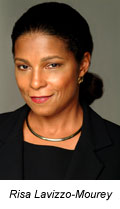 |
Dr. Risa Lavizzo-Mourey is an accomplished physician, scholar, policymaker, administrator and national leader who tirelessly works to improve health care in the United States. She is president and CEO of the Robert Wood Johnson Foundation, America’s largest philanthropy devoted to improving health policy and practice.
The Foundation has an endowment of $10 billion and distributes more than $400 million a year in support of a wide range of health initiatives. These initiatives include preparing health professionals for leadership, developing policies and programs to expand health coverage and supporting cutting-edge solutions to the health care issues of today, such as childhood obesity and improving the quality of health care for all Americans.
Before joining the Robert Wood Johnson Foundation in 2001, Dr. Lavizzo-Mourey was a leader in academic medicine, in her medical specialty of geriatrics and in government service. During her academic career at Penn from 1986 to 2002, she held faculty appointments in Medicine and Nursing as well as the Wharton School, ultimately advancing to become the Sylvan Eisman Professor of Medicine and Health Care Systems and Director of the Penn Institute for Aging.
In Washington, D.C., Dr. Lavizzo-Mourey was deputy administrator of what is now the Agency for Health Care Research and Quality. She has served on numerous federal advisory committees. In December of 2009, Dr. Lavizzo-Mourey testified before a Congressional hearing on combating the epidemic of childhood obesity through innovative community and school-based programs. A practicing physician, Dr. Lavizzo-Mourey continues to treat patients at a community health clinic in New Brunswick, NJ.
Dr. Lavizzo-Mourey earned her medical degree from Harvard Medical School in 1979 and her MBA from Penn’s Wharton School in 1986. Among her many awards are the Distinguished Service Award from the National Medical Fellowships 60th Anniversary Awards Gala, Modern Physician’s 50 Most Powerful Physician Executives, the National Medical Association’s Scroll of Merit and the National Library of Medicine’s Changing the Face of Medicine award. Dr. Lavizzo-Mourey is a member of the Institute of Medicine of the National Academy of Sciences and a master of the American College of Physicians-American Society of Internal Medicine.
|
Greg Mortensen
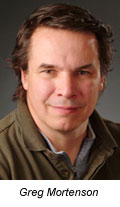 |
Greg Mortenson is a world-renowned humanitarian, philanthropist, best-selling author, adventurer and advocate. He is the co-founder and executive director of the Central Asia Institute, a non-profit organization dedicated to the promotion and support of community-based education and public health initiatives in remote regions of Pakistan and Afghanistan. He is also the founder of Pennies for Peace, an Institute program that works to educate and encourage American children to be active participants in global educational efforts.
To date, he and the Central Asia Institute have established or helped support over 130 schools in these rural and often volatile regions, which provide education to over 58,000 children. Recognizing that community support is vital for long-term viability, each project is undertaken in collaboration with community members who provide guidance and commit labor and resources.
Mr. Mortenson’s work is not without danger. He has been kidnapped by the Taliban and found himself in the midst of a firefight between feuding Afghan warlords. Undeterred, he is one of the few foreigners who has worked extensively on behalf of communities in this isolated part of the world, and Mr. Mortenson’s tireless efforts have gained the trust of Islamic leaders, military commanders, government officials and tribal chiefs.
His first book, Three Cups of Tea, chronicles his journey as he attempted to climb K2, the world’s second highest mountain, and discovered his life’s work of promoting education, especially for girls, in Pakistan and Afghanistan. Mr. Mortenson’s second publication, Stones into Schools, recounts his continuing efforts to establish schools in Pakistan and Afghanistan, his work following the earthquake in Pakistan in 2005 and his ideal of promoting peace through literacy and education.
Mr. Mortenson received his degree in nursing in 1983 from the University of South Dakota. He is the recipient of numerous awards and honors including the Sitara-e-Pakistan (Pakistan’s highest civil award), the Red Cross Humanitarian of the Year award, the Jefferson Award for Community Service from the Kennedy School of Government at Harvard and the National Education Association’s Human Rights Award. In 2009 he was nominated for a Nobel Peace Prize by members of the United States Congress. |
Peter C. Nowell
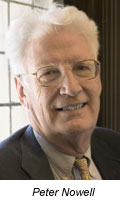 |
Dr. Peter Nowell is one of the most distinguished medical research scientists of his generation. His groundbreaking work in the genetics of cancer, particularly the identification of the “Philadelphia Chromosome,” significantly advanced the world’s understanding of the genetic basis of this disease and provided the modern foundation for the fields of cancer biology and cancer genetics.
Dr. Nowell is the Gaylord P. and Mary Louise Harnwell Professor Emeritus of Pathology and Laboratory Medicine at the University of Pennsylvania. In his nearly 50 years at Penn, Dr. Nowell established himself as one of the world’s most prominent research scientists and outstanding teachers. His research has led to many insights into the processes involved in the normal and abnormal growth of cells and has profoundly impacted the course of medical care. He has served as Chair of the Department of Pathology and Laboratory Medicine and was the first Director of what is now the Abramson Cancer Center at the University of Pennsylvania.
Dr. Nowell received his BA in biochemistry from Wesleyan University in 1948 and his MD from the University of Pennsylvania School of Medicine in 1952. He has authored over 400 articles during the course of his career and has been widely recognized for his pioneering discoveries.
At Penn, Dr. Nowell received the Lindback Distinguished Teaching Award, the Distinguished Graduate Award from the School of Medicine and the Alumni Award of Merit. Among his numerous other honors and awards, Dr. Nowell has received the Albert Lasker Award for Medical Research and the American College of Physician’s Award for Outstanding Work in Science as Related to Medicine. In April 2010 he will be awarded the Franklin Institute’s Benjamin Franklin Medal in Life Science. Dr. Nowell is a member of the National Academy of Sciences, the Institute of Medicine, the American Philosophical Society and the American Academy of Arts and Sciences. |
James S. Riepe
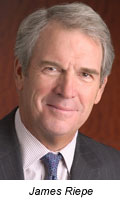 |
For over five decades, James S. Riepe has embodied Penn’s ideals of leadership and service. His loyalty and tireless efforts on behalf of his alma mater date from his undergraduate and graduate student days at the Wharton School, where he received his bachelor’s degree and MBA. As a student, Mr. Riepe honed his leadership skills as captain of the Penn Quakers football team. As a 20-year member of the University Board of Trustees and its Chairman from 1990-2009, Mr. Riepe has served as an astute leader, a generous mentor and a consummate fiscal advisor. In partnership with Penn presidents Judith Rodin and Amy Gutmann, his unwavering dedication and leadership has advanced Penn’s legacy as one of the preeminent educational institutions in the world.
Mr. Riepe is currently Chair of the Penn Medicine Board and its Executive Committee, having served as a board member since its inception. Through the years, Mr. Riepe has brought his expertise to a great number of alumni advisory boards and activities. He has aided others seeking a Penn education by working on behalf of undergraduate financial aid and funding scholarships, including the James Riepe Trustee Scholarship and the Riepe Scholarship Fund, created with his wife Gail Petty Riepe, a graduate of the College for Women. To date, over 45 Penn students have benefited from Riepe scholarships. In 2005, Riepe College House was renamed to honor the Riepes’ support of Penn’s unique undergraduate residential programs.
In addition to his involvement with Penn, Mr. Riepe serves on a number of other boards, including the Board of Directors of NASDAQ OMX Group, Inc., Genworth Financial, Inc., LPL Financial, UTI Asset Management of India, the Baltimore Equitable Society, The Baltimore Museum of Art and the U.S. Ski and Snowboard Foundation. He previously served as chairman of the Board of Governors of the Investment Company Institute and was a member of their Executive Committee for over 20 years.
Mr. Riepe is a Senior Advisor and Retired Vice Chairman of T. Rowe Price Group, Inc. Until his retirement in 2006, he was responsible for overseeing the firm’s global mutual fund and institutional investment activities and served as Chairman of the T. Rowe Price Mutual Funds. Mr. Riepe worked in the investment management business for over 35 years and played a leadership role in mutual fund industry affairs.
|
For Commencement information see www.upenn.edu/commencement or call (215) 573-GRAD
|